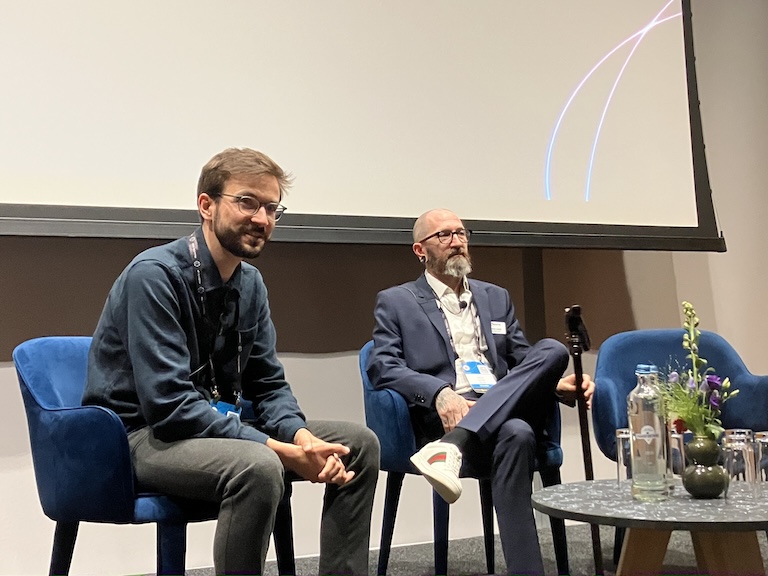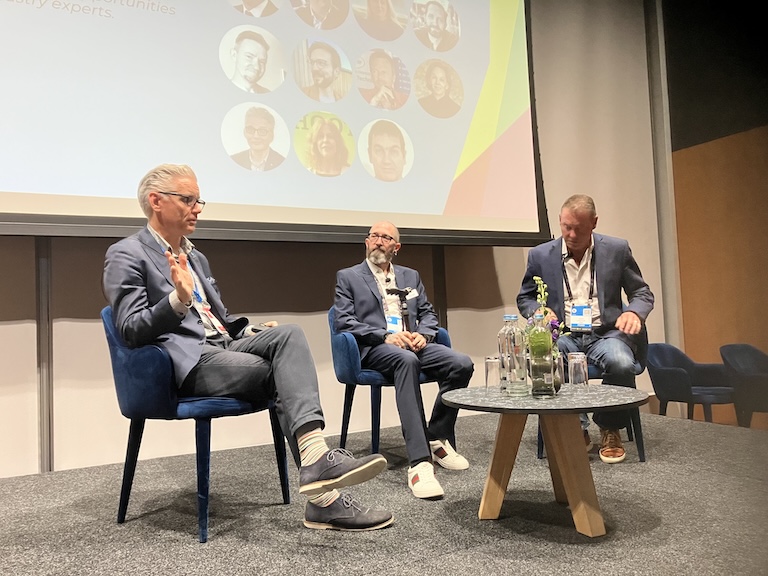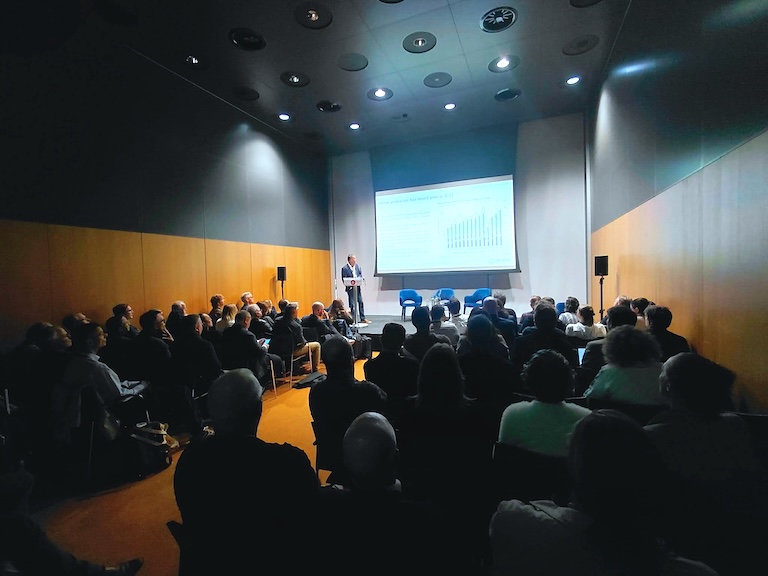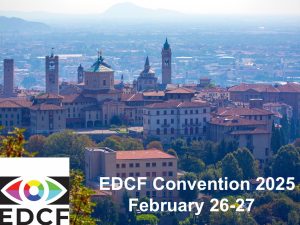The EDCF once again brought together cinema industry professionals for its annual Global Cinema Seminar at IBC 2025, continuing our long relationship with the leading broadcasting media and technology convention.
A diverse lineup of speakers provided valuable perspectives, and our audience reflected the full spectrum of the industry, with representatives from trade associations, equipment manufacturers, studios, post-production and mastering companies, film delivery specialists, sound and image experts, national film institutes, integrators, and cinema operators. This diversity was also mirrored in the programme, which ranged from international market trends and AI to the latest developments in content delivery and post-production workflows.
Setting the scene
Things kicked off on a lighthearted note when Cathy Huis in’t Veld-Esser, President of the EDCF, belatedly handed over an apple pie to last year’s IBC survey winner, Matthew Jones. It’s never too late for a good Dutch bakery.
In her opening remarks, Cathy reflected on the EDCF’s journey since its founding 25 years ago. She also announced that the next EDCF Annual Conference will be held in Warsaw on March 10–11, 2026, as we continue the tradition of hosting our yearly gathering in a different European city.
Guillaume Branders, who earlier this year became the EDCF’s first Executive Director, shared updates on the ongoing EU budget negotiations and their potential implications for the cinema sector. He also offered a look at the Dutch market, where overall admissions fell in 2024 but arthouse cinemas bucked the trend, achieving growth through diverse programming and collaborative initiatives such as the Cineville unlimited subscription card.
Navigating a shifting industry landscape
David Hancock (Omdia) then delivered an engaging global market overview, exploring the different trends affecting the cinema landscape. His analysis looked into the evolving distribution ecosystem, as traditional Hollywood studios are seeing their dominance challenged, not only by major media platforms like Amazon and Apple, but also from players in Asia-Pacific, where national markets are driving growth through locally produced content. On top of that, he highlighted how fewer films are expected to reach the $100 million box office threshold, all while we see a continued increase in the number of films produced and theatrically released every year. We’re witnessing complex shifts in the business models and market realities that have historically defined how our industry operates. And it remains to be seen how all of these will affect box office and the cinemagoing experience in the long run.
On the technology front, David shared data on laser projection growing adoption trajectory, with projections suggesting significant uptake by the end of next year. Premium formats also continue to enjoy headwind and commercial success, as more LED direct view technologies are emerging, with 13 Chinese manufacturers currently in the space.
The present and future of cinema technology
A key moment of the day was the fireside chat between Steve LLamb (Deluxe) and Guillaume on the ongoing challenges around security in cinema technology. This is a particularly complex issue from a technical, commercial and legal standpoint. But the discussion kept it clear and engaging, highlighting the importance of communication across the industry – and how associations like ours could facilitate collaboration in an independent environment. Moving forward, getting all stakeholders involved will be essential to making progress on this vital topic.To take this forward, it was announced that the EDCF and its US counterpart, the ISDCF, will join forces through a dedicated working group on this vital issue.
The second panel of the day focused on AI in cinema, and was moderated by EDCF Vice-President Patrick von Sychowski of CinemaNext, in conversation with David Hancock and Steve LLamb. David offered a broad view of where AI currently stands across the film value chain. While debate often focuses on creative use cases, the reality today is that studios and producers are mainly applying AI to streamline workflows, boost efficiency, and reduce costs. The big takeaway from David’s presentation was that AI should complement human skills rather than replace them, with human judgment remaining essential.
Steve also shared insights from Deluxe, highlighting how AI is already being put into practice on a daily basis, from captioning to localization, data processing and image enhancement. But he also shared practical examples of the clear limitations of certain AI tools today,without human oversight. His central message was that AI’s real potential lies in “scaling, not replacing”: using technology to take creative work further, while relying on human expertise to maintain quality and nuance.
The discussion struck a pragmatic balance between opportunity and caution, making clear that this rapidly evolving technology is already touching every part of the cinema ecosystem. The challenge now is to ensure its use strengthens creativity and standards, rather than undermining them.


Quickfire presentations
The EDCF seminar at IBC also featured its usual series of quickfire presentation sessions on several cutting-edge industry developments.
Araceli Vaello (CinemaNext) presented compelling data on energy monitoring and automation in modern cinemas, demonstrating how comprehensive cinema-specific systems can achieve as much as 36.2 percent reduction in energy consumption, a crucial development given current financial pressures faced by the sector.
On the post-production side of the industry, Stuart Bowling (Barco) addressed HDR content creation workflows, while Cedric Lejeune (Unified Pixels) tackled mastering and image quality challenges with new cinema display technologies, noting that while SDR workflows are now established, HDR still presents problems to solve due to differing technologies.
Chris Connett (Christie Digital) explored the topic of variable dynamic range (VDR) technology from an image quality and energy efficiency perspective, leading to a presentation from Birgit Heidsiek (Green Film Shooting) on sustainable solutions for film productions. Her project was in fact shortlisted for an IBC sustainability award, showing the importance and validity of sustainability for the film and broader media sector. Radoslav Markov (Bulgarian Academy of Science) concluded the day with an exploration of quantum technology applications in cinema workflows.
Next stops for the EDCF: Brussels and Warsaw
Next up for the EDCF will be the UNIC Cinema Days in Brussels on 20-21 November, where the Forum and its members will help co-produce the technical part of the programme. This will also be an opportunity for the EDCF to celebrate its 25th anniversary.
And in 2026, we will be gathering in Warsaw on 10-11 March,for two days of seminars and site visits. We’re looking forward to sharing more with you in the coming weeks. See you soon!



